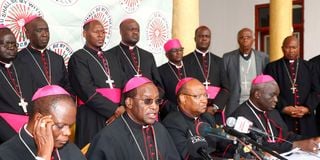Premium
Catholic bishops: No, the Pope did not approve same-sex unions

Archbishop Martin Kivuva leads a press briefing by the Kenya Conference of Catholic Bishops at St Mary’s Pastoral Centre in Nakuru on November 10. The bishops have maintained their stance against same-sex marriages adding that the statement by Pope Francis does not in any way condone such unions.
What you need to know:
- According to the bishops, the understanding within the Catholic Church is that marriage is considered a sacrament and is specifically defined as "an indissoluble union between a man and a woman for life".
Kenya's Catholic bishops have maintained their stance against same-sex marriages, clarifying that this week's statement by Pope Francis does not in any way condone such unions.
In a statement, the chairman of the Kenya Conference of Catholic Bishops (KCCB), Archbishop Martin Kivuva, addressed the confusion surrounding the 'Fiducia Supplicans' document released on December 18, which raised questions about the Church's position on gay marriages.
According to the KCCB chairman, the understanding within the Catholic Church is that marriage is considered a sacrament and is specifically defined as "an indissoluble union between a man and a woman for life".
“This declaration (by Pope Francis) does not in any way approve of same sex marriages nor try to give a backdoor for the recognition of such a union. It does not seek an alternative union blessing to substitute a sacramental marriage,” Archbishop Kivuva said.
Also Read: Catholic Bishops protest high taxes, KRA pressure day after Ruto’s State of the Nation address
In a landmark ruling approved by Pope Francis, the Vatican said on Monday that Roman Catholic priests can give blessings to same-sex couples as long as they are not part of regular church rituals or liturgies.
It said priests should decide on a case-by-case basis and "should not prevent or prohibit the Church's closeness to people in every situation in which they might seek God's help through a simple blessing".
In the document, the Pope insisted that the Church has “no power to confer its liturgical blessing when that would somehow offer a form of moral legitimacy to a union that presumes to be a marriage or to an extra-marital sexual practice.”
Archbishop Kivuva, who heads the Archdiocese of Mombasa, said: “What this document seeks is to awaken the invitation of all people to God’s actions and grace. The church seeks to reach out to all individuals, in order to stir them to the path of conversion and salvation.”

Pope Francis during a past function.
“Consequently, the document recognises that anyone, irrespective of their moral life or faith condition, is welcome to receive blessings from the Church or a church minister. The Church does not withhold a blessing to an individual who seeks it with an attitude of truth and faith. This blessing can be given even to non-Catholics, or non-Christians who honestly wish to receive God’s blessing.”
Archbishop Kivuva added that in offering such a blessing, Catholic bishops “do not bless the immoral actions that they may perform, but hope that the blessings and prayers offered over them as human persons will provoke them to conversion and to return to the ways of the Lord.”
Also Read: Churches up in arms against State regulation
“In our African context, while recognising the confusion existing in more developed countries, of new unchristian models of “conjugal union” and “styles of life”, we are very clear on what a family and marriage is."
Archbishop Kivuva also noted that the Pope's statement expands the scope of blessings beyond formal liturgical settings, encouraging people from all walks of life, regardless of their moral standing, to seek God's blessing.





